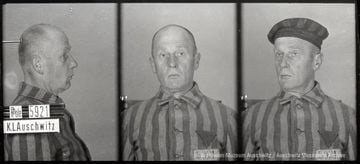Author
Stanisław Kłodzinski, MD, 1918–1990, lung specialist, Department of Pneumology, Academy of Medicine in Kraków. Co-editor of Przegląd Lekarski – Oświęcim. Former prisoner of the Auschwitz‑Birkenau concentration camp, prisoner No. 20019. Wikipedia article in English.
18 December 1965 was the day of the funeral of Dr Józef Żegleń, a physician and community activist who had rendered distinguished service to his country and native area, and a survivor of Nazi German concentration camps. Dr Żegleń was laid to rest in the Podhale mountain region of Poland, the area where he was born, brought up, and with which he was connected for most of his life.
He was born in a peasant family at Bystra Podhalańska on 4 March 1890 and spent his early years in the village of Naprawa near Jordanów. He completed his secondary education in Kraków. In order to achieve his childhood dream of becoming a doctor, he decided to overcome his foreign language problems and went to Vienna to study medicine. However, when the Jagiellonian University reopened in a now independent Poland after the First World War, Żegleń continued his studies there and in December 1919 graduated as a doctor. He did what was expected of young men in the war-ravaged country, that is he joined the armed forces and worked in the garrisons in Częstochowa, Kielce, and Rzeszów.1 Following demobilization, he settled down as a married man in Maków Podhalański near Sucha Beskidzka in order to look after the health of the people of his native region. Having risen in society, he wanted to discharge his moral obligations to his compatriots, both for himself and his younger brother, who had become a doctor too, but died of nephritis two months after his graduation.
Dr Józef Żegleń worked arduously and was totally devoted to his patients. He was both in private practice and took employment as a municipal physician, railway physician, and social security physician. He always devised his own means of finding enough time for his doctor’s career and community work. He was also a good husband and father. In 1939, when he was drafted into the army again, he worked as a regimental physician. After Poland’s unsuccessful defensive campaign against the Germans, he returned to Maków Podhalański. Yet he did not stay a free man too long. He was too well known in the south of Poland and, as a figure of authority, could not be tolerated by the German Gestapo, which had its informers even in small towns. During the AB-Aktion2 Żegleń was put on a proscription list of “dangerous” members of the Polish educated classes, wanted by the Gestapo and due to be eliminated.

Dr Józef Żegleń’s camp photo. Source: Archives of the Auschwitz-Birkenau State Museum. Click the image to enlarge.
Żegleń was arrested in the summer of 1940. He was summoned to report in the local town hall and never returned home. After a few days of detention in Maków Podhalański, he was transferred to Czarny Dunajec and later to Tarnów jail. On 8 October 1940 he was put on a transport of prisoners from Kraków and Tarnów, and sent to Auschwitz. In the camp, he was registered as a political prisoner No. P [Polish] 5921. Although he was fifty, for the first year he had to share the same miserable existence and worked as hard as other inmates, for instance, unloading cement or transporting the dead bodies of his fellow-prisoners. However, he was used to hardship, like all the Polish peasants living in the mountains. Even when his wound was infected with toxins produced by corpses, he managed to tough it out.
After nearly a year spent in Auschwitz, Dr Żegleń was transferred to Gross-Rosen, where he was registered as No. 1486. He managed to get a job in the prisoners’ hospital. He earned the reputation of a true patriot and a conscientious man who never conformed to the camp’s standards of depravity. In the extremely primitive and discouraging conditions, he proved to be a resilient man, a gifted doctor, an excellent organizer, and a friend to his patients. He spared no effort and wasted no opportunity to help those who were ailing and suffering. He used poor substitutes of medicines and resorted to psychotherapy, comforting his mates and offering his smile and optimism: it was all he could do in the dreadful conditions of Gross-Rosen. With no medications or other necessities, the patients’ block was a travesty of a hospital. Luckily, Dr Żegleń was a resourceful person and gained the respect of the SS men and German Kapos, treating them on the quiet. As he could speak German, he earned the trust of the German personnel and made himself indispensable. Then he used his influence, saving lives and preventing violence against the prisoners as well as buying them time off work in the stone quarry, where hard labour was treated as the main method of extermination (there were no gas chambers in the camp). His mates remember him for his impeccable character and as a good, diligent, and fully professional doctor ready to share everything, even his portion of bread, with another prisoner.
The deadly machinery of the camp crushed many personalities even in the first days of confinement, so many Gross-Rosen detainees decided to put a quick end to their lives. Realizing that, Dr Żegleń gave words of consolation to new arrivals and offered advice on how to survive in the camp and uphold the honour of a political prisoner.3 Neither Auschwitz nor Gross-Rosen with their meticulously planned annihilation systems managed to break his moral backbone. He considered it his duty to take proper care especially of the young people, to save both their lives and their integrity. Survivors remember his well-built figure (even in the camp, he was rather stout, which was unusual), his energy, and his very pale face. His eyes were keen, penetrating yet kind. Żegleń’s nickname in the camp was “Dr Jossef.” He was treated as a father and people came to him not only with medical problems, but many other matters. Prisoners of various nationalities and political sympathies, sometimes even criminals like the German Kapos, and even Kurt Vogel, a murderer appointed block elder of the Strafkompanie,4 sought his advice.
Dr Józef Żegleń worked in Block 5, that is the prisoners’ hospital, which took in patients with infectious diseases, such as typhus and typhoid, erysipelas, trachoma, tuberculosis etc. SS men hardly ever went there. Żegleń took advantage of that, admitting prisoners who were about to be transferred to the penal unit or questioned by the political department. He saved the lives of others but contracted both typhus and typhoid himself. The mortality rate in the hospital was very high, but Dr Żegleń cherished the life of every patient. One day, thanks to his ingeniousness and bravado, a seventeen-year-old Soviet boy was saved. He was to be killed on the orders of the political department, but Dr Żegleń presented another adolescent on the verge of death as the condemned teenager. Żegleń knew how intricately the entire camp functioned. Therefore his good judgement and advice prevented many troubled souls, potential suicides, and brash risk-takers from taking a perilous step.
For prisoners one of the curses of Gross-Rosen was trachoma. Dr Żegleń invested all his strength in treating it. Many inmates had the pink eye, so for days on end he kept rinsing their lids, giving them eye-drops, squeezing out the follicles, putting on ointment. Otherwise, some would have gone blind: their corneas were constantly sore due to the quarrying and stone-dressing they did on a daily basis with no eye protection whatsoever and in conditions of slave labour. Dr Żegleń was regarded as the best ophthalmologist for his patience and skills in treating trachoma. He continued to do his duty until the moment when the last transport left Gross-Rosen. Then he had to march to Flossenbürg and on to Dachau, where he was confined until American forces liberated that camp. Indeed, the time was more than ripe. Utterly exhausted, Żegleń managed to reach Poland on 4 August 1945. He decided to go back to Maków Podhalański to help sick people in his beloved Podhale, which he had missed so much in the camp. Both the camp survivors and the inhabitants of his native region are sure to remember Dr Żegleń as an extraordinary man. He will always remain in our memory.
Translated from original article: Kłodziński, S. Dr Józef Żegleń. Przegląd Lekarski – Oświęcim, 1968.
Notes- Although Poland was restored as an independent state In 1918, after 123 years of dismemberment, it had to fight wars with several neighbouring countries to settle the problem of its borders.
- The Außerordentliche Befriedungsaktion (“Operation Special Liberation”) was one of the first operations the Germans conducted against Polish civilians after they invaded Poland. It was targeted against Polish intellectuals. From May to July 1940 they killed about 6,500 Polish citizens, including about 3 thousand members of the educated classes.
- The Germans regarded Poles sent to Gross-Rosen and other concentration camps as political prisoners, not common criminals, but treated them worse than criminals.
- The penal company. Prisoners were punished by being relegated to the Strafkompanie for exceptionally hard labour with slim chances of survival.
Notes by Teresa Bałuk-Ulewiczowa, Head Translator for the Medical Review Auschwitz project.
References
This article was drafted on the basis of the following:
- Letters I received from Dr Żegleń’s wife;
- Dr Żegleń’s biography;
- Documents held by the Archives of the Auschwitz-Birkenau State Museum;
- Letters I received from Dr Żegleń’s colleagues and fellow-prisoners, Dr Zygmunt Kulig and Dr Władysław Bernadzikowski;
- An account by Józef Polak, a Gross-Rosen survivor.


A publication funded in 2020–2021 within the DIALOG Program of the Ministry of Science and Higher Education in Poland.
